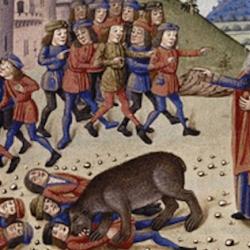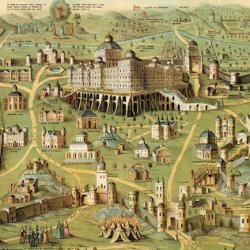INTRODUCTION
Jehoram, the second son of Ahab to reign over Israel, was a somewhat more faithful king than his father (2:2). Unlike his brother, Ahaziah, he attempts to re-conquer Moab. He succeeds because Yahweh provides water miraculously.
THE TEXT
?Now Jehoram the son of Ahab became king over Israel at Samaria in the eighteenth year of Jehoshaphat king of Judah, and reigned twelve years. And he did evil in the sight of the Lord, but not like his father and mother . . . .?E(2 Kings 3:1-27).
STRUCTURE AND TYPOLOGY
2 Kings 3-7 are arranged in a large chiasm:
a. War with Moab, 3:1-27
b. Oil for indebted widow, 4:1-8
c. Raises Shunammite?s son (Gehazi), 4:8-37
d. Food miracles, 4:38-44
c. Heals Namaan the leper (Gehazi), 5:1-27
b. Axehead (borrowed), 6:1-7
a. War with Aram, 6:8-7:20
Chapter 3 is itself neatly arranged:
a. Moabite rebellion, vv 4-5
b. Three kings go out against Moab: no water, vv 6-12
c. Elisha prophecy, vv 13-19
b. Water, v 20
a. Moabites nearly defeated, vv 21-27
Chapter 3 is also closely parallel to 2 Kings 1:
Ahaziah son of Ahab king1 Ki 22:51 Jehoram son of Ahab king, 2 Ki 3:1
like father and mother, 1 Ki 22:52 NOT like father and mother, 2 Ki 3:2
served Baal, 1 Ki 22:53 Removed Baal, 2 Ki 3:2
continued sin of Jeroboam, 1 Ki 22:52 continued sin of Jeroboam, 2 Ki 3:2
Moabite revolt, 2 Ki 1:1 Moabite revolt, 2 Ki 3:4-5
King sends to Ekron, 2 Ki 1:2 King sends to Jehoshaphat, 2 Ki 3:7
Elijah intervenes, 2 Ki 1:3-4 Elisha called, 2 Ki 3:11-19
Elijah throws fire, 2 Ki 1:9-16 Elisha brings water, 2 Ki 3:20-27
There are also parallels between the Moabite war and the war between Israel and Aram in 1 Kings 22, particularly with respect to Jehoshaphat?s participation (cf. 22:4 with 2 Kings 3:7; 22:7 with 2 Kings 3:11). Both battles end with ultimate defeat for Israel. And this means that Elisha?s prophecy is somehow parallel to the prophecy of Micaiah and the equivocal prophecies of Ahab?s lying prophets.
Water is the key motif in the chapter. Elisha is described as the prophet who ?poured water on Elijah?s hands?E(v. 11). The three kings are in crisis because they are in the wilderness without water (v. 9), reminding us of Israel?s wilderness wanderings in Exodus and Numbers. Yahweh miraculously provides water (vv. 17-19), which appear to be blood (vv. 22-23), reminding us of the first plague in Egypt. Yahweh?s water is deliverance for Israel and judgment for Moab.
MOABITE REVOLT
Moab had been subject to Israel since the time of David, and Ahab had been exacting an enormous tribute from him (3:4). When Ahab dies, Mesha (whose name is related to the verb for ?save?E takes the opportunity to separate from Israel, leading Moab on an ?exodus?Efrom Israel. This fits the internal typology of Kings: Ahab is a perverse Solomon; just as Israel was divided in the days of Solomon?s son, so the Northern Kingdom is divided in the days of Ahab?s son (cmp. 2 Kings 3:5 with 1 Kings 12:19). Ironically, this ?division of the kingdom?Eunites Israel and Judah in battle. Jehoshaphat cooperates with Jehoram as he had cooperated with Ahab. In 1 Kings 22, though, Jehoshaphat asked to consult a prophet before going to battle; here, he doesn?t think to consult a prophet until they are in a crisis.
A PROPHET OF YAHWEH
As noted above, Elisha?s prophecy is similar to that of Micaiah?s in 1 Kings 22. In 1 Kings 22, Yahweh lured Ahab to his death by sending a lying spirit into the mouths of his prophets. Despite the fact that Jehoram has put away the Baal, Elisha sees that Jehoram has not made a complete break with the idolatries of his parents and urges him to consult Ahab?s prophets (v. 13).
Elisha uses music to assist in prophesying (v. 15). The idea seems to be that music calls on Yahweh to draw near and reveal Himself. Elisha?s prophecy is compressed and cryptic in several respects. Verses 16 is translated as an imperative, but it could be an infinitive, describing what Yahweh is going to do: ?To make the wadi pools, pools.?E Verse 19 is sometimes taken as an imperative as well, but it is merely a prediction. Deuteronomy 20 forbids Israel to make war on trees or land, but Elisha predicts that this is what the three kings will do. Just as Yahweh saves Israel and Judah by sending water in the wilderness, so He judges Moab by stopping up their water sources.
BATTLE
Through the water, Yahweh draws Moab into a trap. After marching for seven days, as the sun rises on a new day, Yahweh brings a Sabbatical judgment on Moab ?Eshades of Jericho. But there is a twist at the end. The king of Moab sacrifices his firstborn on the wall (v. 27), and wrath comes on Israel. This is a difficult passage, but one obvious conclusion is that the expedition of the three kings ends in failure. Yahweh is angry at Israel, and prevents Jehoram from reasserting his authority over Moab. Mesha?s ?exodus?Eis successful; Gentiles have made their way out of Israel.
For Further Study
1. Ahaziah became king in the 17th year of Jehoshaphat, and he reigned two years (1 Kings 22:51). Yet Jehoram became king in the 18th year of Jehoshaphat (2 Kings 3:1). How do you explain that?
2. According to 2 Kings 1:17, Jehoram of Isael became king in the ?second year of Jehoram, the son of Jehoshaphat.?E Yet 3:1 dates Jehoram of Israel?s reign to the ?E8th year of Jehoshaphat.?E How do you explain that?
3. Kings 10:27 says that Jehu destroyed the pillar of Ahab. But 3:2 says that Jehoram put the pillar away. How are these two verses compatible?











